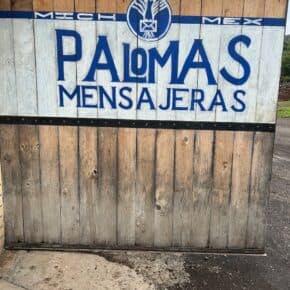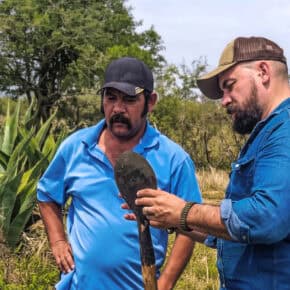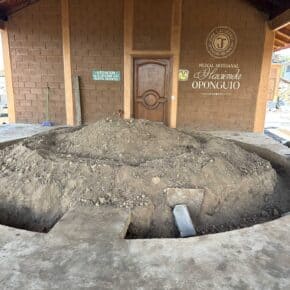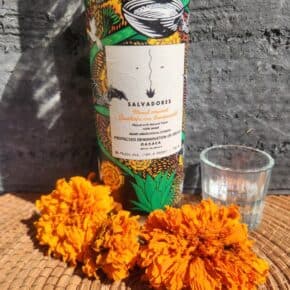Francisco Terazas has been a jack of all trades in the agave and wider hospitality world for well over a decade. If you’ve been a longtime lover of mezcal and/or bars with good Mexican spirits programs, you have almost certainly enjoyed the fruits of his labor without knowing it. Francisco is a behind-the-scenes, under-the-radar kind of guy, usually seen as quiet by those who don’t know him, and is known as one of the nicest, hardest working, and honest people in the industry. His various roles have helped to shape the Mexican spirits category in meaningful ways, from his work with Vago Mezcal and Paranubes rum to his role with the Tucson Agave Heritage Festival and his newly launched import company, he continues to create community anchored in the strong values that the industry is in desperate need of as it grows. He has recently taken on a new position as the Executive Director of the Tequila Interchange Project.
Where did you grow up?
I grew up in Tucson, Arizona.
What and where did you study?
I studied marketing and Spanish at the University of Arizona.
What was your first job?
My first job was lifeguarding. My first real job was restaurant marketing for local independent restaurants.
What skills or wisdom from that first real job did you develop and take with you into your current work?
I developed some key personality traits…like constantly reminding myself to have a sense of humility. This was developed in me when I first started working in service and transcends into my brand work, where I bring a sense of humility on the consumer side and the producer side.
You have to drop a large sense of ego in order to make things approachable and to build community between consumers and producers–as reps we are in the middle, a welcoming conduit to help people learn. This strong sense of humility and knowing where I fit into the category has stuck with me since my first days as a bartender, or even bussing tables, all the way to today where we are trying to share info and carve niches for ourselves in the category.
Another aspect I learned early on was to have a healthy sense of curiosity. Never thinking you know all there is to know or being satisfied with the amount you do know, because that is a recipe for stagnation and complacency; especially if you want to make a space for yourself you have to be constantly learning and sharing, without letting it inflate your ego. Especially with a category that is so tied to natural sciences and cultural sciences and humanities, it’s really hard to say you know all there is, or even enough. People who have studied for decades continue to study and that inspires me to maintain my sense of curiosity.
What was your introduction to mezcal?
My first taste was at my first bartending job in Tucson at a place called the Red Room. RIP. Once I moved to Texas, in 2011, I met David Suro and started communicating with him. I really started learning about agave spirits when I was the General Manager of the Pastry War Mezcalería in Houston, Texas. Also RIP.
How do you describe your role in the agave world?
Well, I don’t really think it’s for me to say what my role is. I’d say that’s more of an external perspective. However, I will try to explain what I do. I have very bad ADHD, so I tend to get bored very quickly. As such, I’ve tried to keep a lot of irons in the fire. I’ve organized events, I’ve been an educator, developed brands and products, I’ve managed a team. I’ve worked very hard to promote the culture and category to the consuming public.
Who have been some of the most influential people on your journey?
Oh boy, I’ve been extremely lucky to work for and with some very incredible people. I have to give a lot of credit to David Suro, who has been a mentor to so many people in the industry. He really started to shape the lens through which I look at agave spirits. From there I got to work with Bobby Heugel who taught me how to run a bar program with integrity, abandon your ego and host people, how to manage a team, and to just be a good bartender and have fun doing it. Then I got to work with the incredible Vago team from very early on. Dylan Sloan and Judah Kuper are really great friends and have shown me how to be incredibly dedicated to a goal and a project and focus on what I’m doing rather than what others are. Pedro Jimenez and Misty Kalkofen have also become great friends and mentors who have shown me how important it is to keep producers front and center of what we do in terms of education and promotion. Diana Pinzon, co-founder of Zinacantan, and Doug Smith, owner of Bar Crisol in Tucson; both come from an academic background and are consistently my sounding boards and counselors for balancing the more commercial aspects of what I do against integrity.
Thanks to them I’ve come to better understand the ideas of appreciation vs appropriation and fetishization. And lastly, but I’d say for whom I am most grateful to know are all of the incredible producers I’ve gotten to call friends who have taught me so much. Sosima Olivera from Fanekatsini, Fabiola Torres-Monfil from Zinacantan, Aquiino García Lopez and Tío Rey from Vago and Jose Luís Carrera from Paranubes. Those are just a few of the people that come to mind. Just wonderfully graceful people with zero ego about what they do and focus on their families and communities and how producing spirits, yes in a microcosm is something to be proud of, but each of them thinks of it in a broader context of being able to provide for their family, and community while preserving traditions and ecosystems.
What are your current endeavors?
As I mentioned before, my short attention span really impacts my professional life, so I have to have a lot of things going on and always be stressed to feel like I’m being productive. Super healthy, super normal. I was lucky enough to be working for Mezcal Vago when we started working on Paranubes Oaxacan rum. I’m a partner in Paranubes and we all work on that project collectively. We actually have some new things going on with that in terms of new expressions, organizing our barrel program, and a couple of new things on the horizon that I think will really blow people’s minds.
For the past four years, I have also been working with the Agave Heritage Festival here in Tucson, which is in its 16th year. It’s a four-day festival that celebrates agave culture, agave spirits, and the history of the plant in this region. It’s an incredible event that includes dinners, tastings, classes, bar takeovers, music and art events, and research collaborations with the University of Arizona. I really think it’s the best, most comprehensive agave event in the United States and it really only makes sense to happen here in Tucson where there’s documented agave cultivation dating back thousands of years. Literally a five-minute drive from where I sit right now.
I also recently started my own import project, Raíces Imports, which is committed to working with producer-owned or regionally-focused projects. With the rapid growth of the market, I have come to see too many situations where producers were underpaid or otherwise marginalized in the commercialization process. I wanted to create a more direct connection from consumer to producer, and I wanted to continue to put the producers front and center (assuming they wanted to be). Also with so many curated brands on the market, I started to see a handful of brands bottling (certainly wonderful) mezcal under their labels, but often sourcing from the same five or six producers. Granted these producers are almost always producers of stellar mezcal, but it began to get a little confusing, and as a buyer, it becomes harder and harder to decipher what separates all of these projects from one another.
I also wanted to work with very limited production projects that are committed to ecologically responsible practices. I have seen so many brands start out saying how “sustainable” they are just to grow to a size that can never be sustainable given how extractive mezcal production is. Right now I only import one brand, Zinacantan from southern Puebla which is a remarkable project from mezcalera Fabiola Torres-Monfil, and her business partner, Diana Pinzon. They only produce 1,500 liters per year with a goal to only grow by 2% over the next few years. Their regenerative approach could really change the agave industry. I also help represent a really great bacanora brand called Los Cantiles. The actual importers are my family’s HVAC guys, so being in Tucson, they don’t really have a lot of time to be out slinging agave spirits, but they have known the producer for years and actually went to high school with him. They are committed to promoting and preserving the ranchero culture of the Sonoran borderlands. If anybody needs their A/C worked on, holler.
All of these projects are part-time and really come from a place of passion. In order to sustain all of these smaller efforts, I recently took a full-time position as the Executive Director of the Tequila Interchange Project. The Tequila Interchange Project was founded in 2010 by David Suro to promote education and sustainable practices to ensure a healthy long-term future for the culture, environment, and stakeholders of the agave spirits industry. The project was on hiatus over the last few years due to COVID, and other external factors, however, we are very excited to make a big splash in 2025. We are currently in the fundraising and planning phase, having just had our first board meeting, but we are forming plans to restart some of our own internal programs like our service industry exchange trips and DO input campaigns, as well as forming new ones and finding other existing non-profit projects to partner with in Mexico.
What’s next, looking forward…
I’m really very excited about some of the producers I’m working with to get online with Raíces. I am incredibly proud of that project, and it’s the first thing I’ve done that’s really “mine.” It’s very small and I’ve designed it that way so that I’m not reliant on moving large volumes of product. I really feel like humble ambitions are the only way to keep the category moving forward in a way that is as close to sustainable as any project can ever really be. As Diana is quick to say, “mezcal is NOT sustainable. Anybody who says it is, is lying to you.”
I’m also incredibly proud and honored that David asked me to come on board with the Tequila Interchange Project (TIP). I’ve been a huge fan and supporter of the project since I first met David in 2011, but we were never able to find a way to make working together make sense. It finally came about after a year of planning. David is incredibly supportive of me taking the ball and running with it, and as of now, TIP is kind of a blank slate as far as programs we can and want to implement. I am incredibly excited to build an organization that ignites passion in people and has a profound impact on preserving culture, tradition, and best practices in the agave spirits industry. We really want to create an organization that people are eager to talk about and support.












Leave a Comment